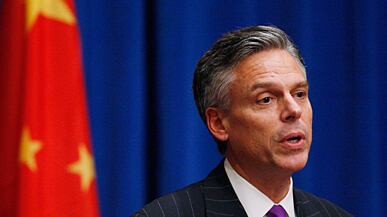Jon Huntsman, who’s expected to announce his presidential candidacy before the end of May, apparently failed to receive the memo informing him that he’s disqualified from winning the GOP nomination because of his Mormon faith. In fact, the new contender and his most ardent admirers seem to believe that when it comes to overcoming one of the nation’s most stubborn forms of religious bigotry, two Mormon candidates may be better than one.

Mitt Romney, of course, is the first member of the Church of Jesus Christ of Latter Day Saints to launch a 2012 drive for the nation’s highest office, reprising his ill-fated race of four years before. During that frustrating campaign, the press focused obsessive attention on the issue of Romney’s faith, forcing the candidate to make a major address on religion and politics at the George H. W. Bush Library at Texas A&M—a well-received speech that only partially defused concerns about the religious commitments of the former Massachusetts governor.
According to conventional wisdom, anti-Mormon sentiments (particularly among self-described evangelical Christians) destroyed Romney’s prospects in the Iowa caucuses and the South Carolina primary, thereby crippling his lavishly financed campaign.
If hostility to the LDS church helped scuttle the hopes of a polished figure like Mitt Romney, how could the little-known Jon Huntsman ever hope to overcome that prejudice? After all, his Mormon commitment plays an unmistakable role in his biography, with youthful service as a missionary in Taiwan and adult service as a two-term governor of Utah. His mother’s father, David B. Haight, served as a member of the church’s highest leadership body (The Quorum of the Twelve Apostles).
The skeptical view of Hunstman’s prospects suggests that anti-Mormon sentiment hasn’t focused on him yet only because most people outside the state of Utah (where he won election to his second term with an astonishing 78 percent of the vote) have never even heard of him.
Given that Huntsman will be the second Mormon in the race, there’s an inevitable ho-hum factor to any discussion of his faith.
For two powerful reasons, however, there’s little chance that Huntsman’s imminent campaign will inspire as much attention on his religious outlook as did Romney’s race in 2008.
Most obviously, the novelty factor of a serious Mormon candidacy will play a far smaller role than it did for Romney four years ago. When Huntsman gets into the race, no one could claim that he’s breaking some important barrier for members of his church; given he’ll be the second Mormon in the race, there’s an inevitable ho-hum factor to any discussion of his faith.
Everyone remembers that John Kennedy was the first Catholic elected to the presidency—or the vice presidency, for that matter. After that milestone in 1960, did anyone pay attention to subsequent Catholic nominees?
As a matter of fact, one of the two major parties nominated a Catholic for vice president in each of the next three elections in a row, but religious issues played no role in those campaigns. The Democrats nominated non-Protestants in 1988 (the Greek Orthodox Michael Dukakis) and again in 2004 (the Catholic John Kerry) without any controversy about shattering tradition or offending narrow religious sensibilities.
Along similar lines, Hillary Clinton inspired endless commentary (and a good deal of frank admiration) as the first woman to make a serious race for president in 2008. A mere four years later, both Sarah Palin and Michele Bachmann may become significant candidates, but their gender is the least controversial thing about them.
There’s also reason to assume that anti-Mormon attitudes have moderated in the last four years, in good measure because of Romney’s candidacy. In December, 2006, 36 percent of Republicans in a Washington Post/ABC poll said they’d be “less likely” to vote for a Mormon for president. Less than five years later (March 15, 2011), a PPP poll found only 20 percent of Republicans who said they were unwilling to vote for a Mormon.
No close observer of popular culture can fail to notice the far greater mainstream acceptance of the LDS church in recent years. In 2011, the Broadway musical that leads the way with 14 Tony Awards is a largely affectionate satire of LDS missionaries in Africa called The Book of Mormon. The newly appointed president of the redoubtably secular and unabashedly liberal University of Washington is a devout Mormon named Michael Young—a direct descendant (inevitably) of Brigham Young himself.
The recent success of basketball and football teams from BYU hasn’t provoked a backlash of disgruntled paranoids who worry about LDS doctrine or conspiracies. Finally, there’s media talker Glenn Beck, who drew 300,000 participants—mostly evangelical Christians—to his 2010 rally in Washington; he may provoke passionate resentment, but very little of it centers on his Mormon faith.
There is a second reason—tactical and political—that religious questions will barely surface in Huntsman’s campaign. Unlike Romney in 2008, the former Utah governor isn’t counting on Christian conservatives as his principal base of support. In the early stages of the last campaign, Mitt maneuvered to run to the right of his major opponents. In 2008, a Florida televangelist named Bill Keller set up a website called “A Vote for Romney is a Vote for Satan.”
Huntsman, by contrast, will run as the most centrist of the major contenders, with positions on immigration, civil unions, the environment, and service in the Obama administration (as ambassador to China) that already make him anathema to many leaders of the conservative faith community. He counts instead on the less fervently religious Republicans and independents (who can vote in many key GOP primaries) and who, according to polls and history, are much less likely to harbor strident anti-Mormon attitudes.
In fact, the former Utah governor’s moderate orientation gives him a stronger resemblance to prior (and surprisingly non-controversial) Mormon presidential candidates than it does to Mitt Romney. Mitt’s father George Romney, former governor of Michigan, emerged as the most formidable challenger to Richard Nixon for the GOP nomination in 1968, but before the emergence of the religious right as a major force, his faith never generated heated debate. In 1976, Arizona Congressman Mo Udall battled Jimmy Carter for the Democratic nomination, running second in total convention votes. In 2008, Mo’s son, Mark, became a senator from Colorado and his nephew, Tom, entered the Senate from New Mexico; with none of the Udalls did their Mormonism interfere with their campaigns—any more than it has for their fellow Democrat, Harry Reid.
For those in the evangelical community and elsewhere who reject Mormon teaching as so unusual and even bizarre that it should disqualify any Mormon candidate, it’s worth remembering that every religion looks profoundly peculiar to outsiders. Many of my friends consider it odd, and even cultish that as an Orthodox Jew I can walk nearly three miles to synagogue on a Saturday morning, but can’t flip the switch on the garbage disposal when I come home. People raised outside the Christian tradition may wince at the notion that, according to many denominations, perfectly kind, generous neighbors will be consigned to eternal torment without a personal relationship to Jesus.
Most Americans want to select our leaders based on the best means to bring heavenly values to this world, rather than speculating on which politicos will experience salvation or damnation in the world to come. Many Republican voters will no doubt find strong reasons to oppose Jon Huntsman, but distrust of his Mormon faith won’t count as prominent among them.
Michael Medved hosts a nationally syndicated daily radio talk show heard by more than 4 million listeners. He is also the author of 12 nonfiction books, most recently The 5 Big Lies About American Business.





